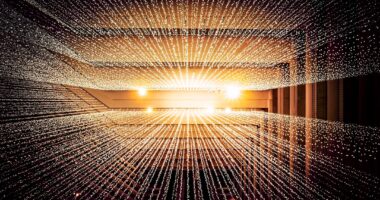Non-fungible tokens (NFTs) are unique digital assets that represent ownership or authenticity of specific digital content, such as art, videos, music, or collectibles. Unlike fungible cryptocurrencies, NFTs cannot be exchanged on a one-to-one basis due to their unique nature. Built on blockchain technology, NFTs ensure secure and immutable ownership records of digital assets.
NFTs operate through smart contracts, which are self-executing agreements coded into the blockchain. These contracts automatically transfer ownership when an NFT is bought or sold, eliminating the need for intermediaries. NFTs can also include royalty mechanisms, allowing creators to earn a percentage from future sales of their work.
The blockchain provides a public, verifiable record of NFT ownership and provenance, enabling buyers to confirm the authenticity and history of digital assets. This technology is transforming the digital content market, offering new monetization opportunities for creators and unique ownership experiences for collectors.
Key Takeaways
- NFTs are unique digital assets that represent ownership of a specific item or piece of content and are stored on a blockchain.
- NFTs have gained popularity in the digital art world, allowing artists to sell and authenticate their work in a new way.
- NFTs are connected to blockchain technology, which ensures the security and authenticity of the digital assets.
- NFTs have had a significant impact on the music and entertainment industry, allowing artists to sell exclusive content and engage with fans in new ways.
- NFTs are changing the game for collectibles, allowing for the buying, selling, and trading of digital items in a secure and transparent manner.
The Rise of NFTs in the Digital Art World
Empowering Digital Artists
NFTs have unlocked new opportunities for digital artists to monetize their work and reach a global audience of collectors. By tokenizing their art as NFTs, artists can sell their work directly to collectors, bypassing traditional art galleries and auction houses, and retaining more control over the sales process. This allows them to earn a larger share of the proceeds and connect directly with their audience.
Benefits for Collectors
Collectors have been drawn to NFTs as a way to own unique digital art pieces and support their favorite artists. NFTs provide collectors with a secure and transparent way to verify the authenticity and ownership history of digital art, making it easier to buy and sell with confidence. Additionally, NFTs enable artists to include royalty mechanisms in their smart contracts, ensuring that they receive a percentage of any future sales of their work, providing a potential ongoing revenue stream.
A New Era for Digital Art
The rise of NFT marketplaces dedicated to digital art has further fueled the growth of this market, providing a platform for artists and collectors to connect and transact. Overall, NFTs have revolutionized the digital art world by providing a new way for artists to monetize their work and for collectors to own and trade unique digital art pieces in a secure and transparent manner.
NFTs and Blockchain Technology: How They Are Connected

NFTs are closely connected to blockchain technology, which serves as the underlying infrastructure that enables the creation, buying, selling, and ownership of these unique digital assets. Blockchain is a decentralized and distributed ledger that records all transactions across a network of computers, ensuring transparency, security, and immutability. When it comes to NFTs, blockchain technology is used to create a secure and transparent record of ownership and provenance for each digital asset.
Each NFT is represented by a unique token that is stored on the blockchain, providing a public and verifiable record of ownership that cannot be altered or tampered with. Smart contracts are another key component of the connection between NFTs and blockchain technology. Smart contracts are self-executing contracts with the terms of the agreement directly written into code.
When someone purchases an NFT, the transfer of ownership is automatically executed through a smart contract, eliminating the need for intermediaries and ensuring a seamless and secure transaction. Additionally, smart contracts can include royalty mechanisms that allow creators to earn a percentage of future sales each time their NFT is resold, providing a potential ongoing revenue stream for artists and creators. Overall, blockchain technology plays a crucial role in enabling the creation and functionality of NFTs, providing a secure and transparent infrastructure for the buying, selling, and ownership of unique digital assets.
The Impact of NFTs on the Music and Entertainment Industry
NFTs have also made a significant impact on the music and entertainment industry, offering new opportunities for artists, musicians, and content creators to monetize their work and engage with their fans in innovative ways. Musicians have embraced NFTs as a way to release exclusive music and collectibles directly to their fans, creating new revenue streams and deepening their connection with their audience. By tokenizing their music as NFTs, artists can offer limited edition releases, exclusive access to live events or merchandise, and even unique experiences such as meet-and-greets or private performances.
This direct-to-fan model allows artists to retain more control over their work and earn a larger share of the proceeds compared to traditional music distribution models. In the entertainment industry, NFTs have been used to release exclusive digital collectibles tied to movies, TV shows, and video games. These digital collectibles can include unique artwork, behind-the-scenes content, or virtual items that fans can collect and trade.
NFTs have also been used to create virtual real estate in online worlds such as Decentraland or The Sandbox, allowing fans to own and trade virtual land and assets within these virtual environments. Overall, NFTs have opened up new opportunities for artists and content creators in the music and entertainment industry to engage with their fans, monetize their work, and create unique experiences that were not possible with traditional distribution models.
NFTs and Collectibles: How They Are Changing the Game
NFTs have had a profound impact on the world of collectibles, offering a new way for collectors to buy, sell, and own unique digital assets in a secure and transparent manner. Collectibles such as trading cards, artwork, virtual items, and even virtual real estate have been tokenized as NFTs, allowing collectors to own these items as unique digital assets with verifiable ownership on the blockchain. This has opened up new opportunities for collectors to buy and sell rare and exclusive items from anywhere in the world without the need for physical delivery or intermediaries such as auction houses or marketplaces.
NFT marketplaces dedicated to collectibles have emerged as hubs for collectors to discover and trade unique digital assets. These marketplaces provide a platform for collectors to connect with each other and transact in a secure environment with transparent ownership records. Additionally, NFTs have introduced new dynamics to the world of collectibles by enabling creators to include royalty mechanisms in their smart contracts, ensuring that they receive a percentage of any future sales of their collectible items.
This has created new revenue streams for creators while also providing collectors with confidence in the authenticity and provenance of the items they are purchasing. Overall, NFTs have revolutionized the world of collectibles by offering a new way for collectors to own unique digital assets with verifiable ownership on the blockchain.
NFTs and Ownership: Exploring the Concept of Digital Ownership

Empowering Creators
The rise of NFTs has significant implications for creators, who can now monetize their work by selling it as NFTs while retaining control over its distribution and earning potential ongoing royalties from future sales. This new revenue stream has opened up new opportunities for creators to profit from their digital content.
New Opportunities for Collectors and Buyers
For collectors and buyers, owning an NFT means having verifiable proof of ownership that cannot be duplicated or tampered with. This has created new opportunities for individuals to invest in digital assets with confidence in their authenticity and provenance. Additionally, owning an NFT provides collectors with the ability to trade these unique digital assets on secondary markets without the need for intermediaries or complex legal processes.
Expanding the Concept of Digital Ownership
The concept of digital ownership has also extended beyond traditional forms of content to include virtual real estate in online worlds such as Decentraland or The Sandbox, where individuals can own and trade virtual land and assets within these virtual environments. Overall, NFTs have transformed the concept of ownership by offering a new way for individuals to own unique digital assets with verifiable ownership on the blockchain.
The Future of NFTs: What to Expect in the Coming Years
As NFTs continue to gain traction in various industries, it’s clear that they are here to stay and will likely play an even larger role in the future. In the art world, we can expect to see more established artists embracing NFTs as a way to reach new audiences and monetize their work directly. Additionally, we may see more traditional art institutions incorporating NFTs into their business models as a way to adapt to changing consumer preferences and behaviors.
In the music industry, we can expect to see more musicians experimenting with NFT releases as a way to engage with their fans and create new revenue streams outside of traditional music distribution channels. We may also see more innovative uses of NFTs in live events and virtual concerts as technology continues to evolve. In the world of collectibles, we can expect to see more diverse types of items being tokenized as NFTs, including virtual fashion items, limited edition sneakers, and even experiences such as virtual meet-and-greets with celebrities.
Overall, the future of NFTs looks bright as they continue to disrupt traditional business models across various industries while offering new opportunities for creators and collectors alike. As technology continues to evolve and consumer behaviors shift towards digital experiences, we can expect NFTs to play an increasingly important role in how we buy, sell, and own unique digital assets in the coming years.
If you’re interested in learning more about the potential career opportunities in the NFT space, be sure to check out this article on NFT-Jobs.com. The article provides valuable insights into the growing demand for professionals with expertise in non-fungible tokens and how you can position yourself for success in this exciting industry.
FAQs
What is NFT?
NFT stands for non-fungible token, which is a digital asset that represents ownership or proof of authenticity of a unique item or piece of content using blockchain technology.
How does NFT work?
NFTs are created, bought, and sold on blockchain platforms using smart contracts. Each NFT has a unique digital signature that makes it distinct and cannot be replicated.
What can be turned into an NFT?
Almost anything digital can be turned into an NFT, including artwork, music, videos, tweets, virtual real estate, and more.
Why do NFTs matter today?
NFTs matter today because they provide a new way for creators to monetize their digital assets, offer ownership and authenticity in the digital world, and have the potential to revolutionize various industries such as art, gaming, and entertainment.





